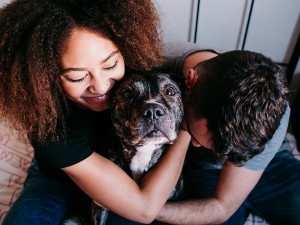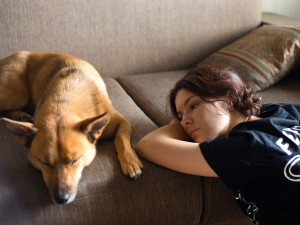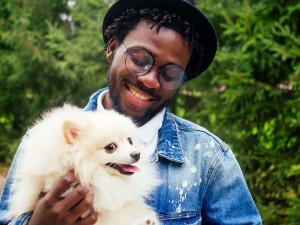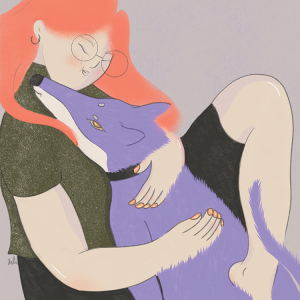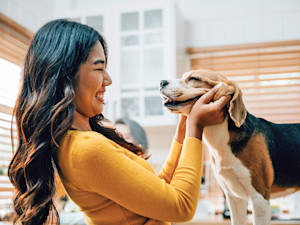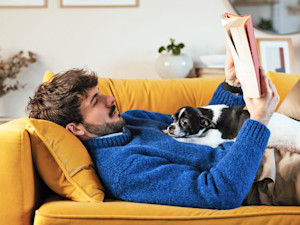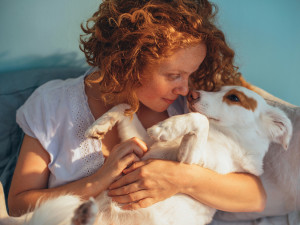What Is a “Soul Dog?”
And how do you know when you’ve found yours?
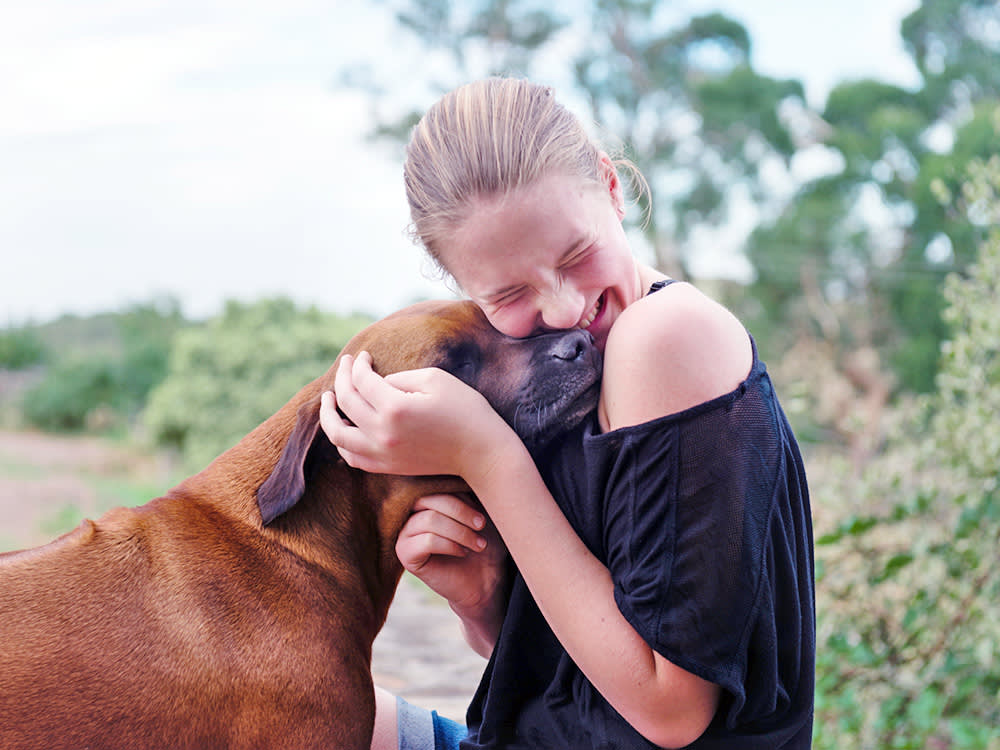
Share Article
You’ve heard of the concept of a soulmate — even if you haven’t quite found one yet, or you’ve found more than one — but have you heard of a “soul dog?” It’s pretty much the same thing, and you’ll likely know when they come into your life.
When I was 17 years old, I brought home a tiny Jack Russell Terrier puppy. Even though she loved to bite me, we bonded instantly, and I rarely went anywhere without her. Over the coming years, I organized every part of my life to fit her, from where we lived to where we went on vacation. Where I go, she still follows, 14 years later.
Characteristics of a soul dog
Not everyone meets their soul dog as a puppy, and no two soul-dog relationships are alike. I asked certified dog behavior consultant Kellie Stevens of Gonzo Dog Trainingopens in new tab what some of the characteristics of a soul dog are: “A soul dog is a dog who just touches every part of you. I’m not talking about expectations of a dog, like a dog who loves everyone they meet or does funny things for TikTok, but a dog and a person who complement each other’s strengths and weaknesses, who love each other in spite of everything and learn to work together as a team,” she says.
She adds that a soul dog is “a dog you learn things from that you know will be a part of you long beyond their lifetime.”

Signs that you’ve found your soul dog
So, you and your dog have been together for a while, but how do you know you’re meant to be together? There are some signs that you’ve found your soul dog.
Intuitive communication
It can be difficult to get your dog to do what you say all of the time, even with thorough training sessions. One way you can tell you’ve found your soul dog is if you have intuitive communication. In other words, you feel like your dog understands what you’re trying to convey to them without it needing to be reinforced.
Shared personality traits
Sure, dogs are dogs and people are people, but if you spend enough time with your dog, you’ll likely find that your personalities start to fit together. Maybe you’re an introverted person who prefers to spend time at home than partying. You might sense that your dog, too, is less than outgoing at the dog park.
“Dogs have this special way of mirroring our behaviors back to us, even ones we may not know exist. So if we listen to their behavior, and take a look inside at our own feelings and behavior, we can learn a lot,” says Stevens.
Life-changing impact
“Are they a dog? Do they make you feel things? They will probably heal your soul in some way! It’s kind of their thing,” Stevens says. I know that my dog, Bowie, made me a more responsible person and fundamentally affected my life. If you feel like your dog has had a life changing impact on you, they might just be your soul dog.
How do you recognize your soul dog?
Not everybody has to find their soul dog as a puppy. In fact, it’s super likely that your soul dog is waiting in a shelter somewhere to be rescued by you. A grown rescue dog already kind of has an established personality, which means you’ll soon know if you’re a good match for each other.
“I want to dispel the myth that you bond more strongly with a puppy than an adult dog! In some ways, I think it's easier to bond with an adult dog (given time) because their personality is already formed and they have more of an attention span to connect with us,” Stevens says. “Don't worry that bringing an adult dog into your home means you won't be able to form a strong bond.”
The philosophy behind soul dogs
If you’re bonded with your soul dog, you’ll have a relationship with each other that nobody could ever replace. That gives you a serious responsibility to nurture and protect them at every stage of their life, including at the end. “When my first dog's life was coming to an end, our vet said one of the most validating things I've ever heard,” says Stevens. “They said, ‘I can see how strongly you and your dog are bonded. You will know when it's time to let him go.’”
That, Stevens says, is how she views the definition of a soul dog. “You know each other inside and out. You know their body language, their feelings, what they like, what they dislike... you can tell what they're going to do before they even do it.”
How to care for a soul dog
For the most part, caring for a soul dog is basically the same deal as caring for any animal that you bring into your home. They need food, shelter, and love every single day of their life. Depending on how deep you feel your relationship is, there might be further responsibilities. “First, recognize that you've entered a relationship with another species — not a human or a dog trained to mimic human behavior on television,” Stevens says. “A lot of the disappointments and disconnects I see between humans and dogs is that we expect them to think, feel, and act like humans. Once you start to learn what a dog really is, you can start to learn who your dog really is!”
Stevens adds that there is no such thing as a perfect dog, and as humans, we need to understand their quirks. “You care for a soul dog the same as any dog: by learning and respecting their communication, teaching them what behaviors you want and expect of them, learning what their individual needs are, and meeting those needs regularly, being consistent, and especially learning how to work with them without the use of punishment. There are few things I see break a dog’s trust or their relationship with their human faster than punishment.”
A relationship with a soul dog is a symbiotic one
After spending some time with Bowie and I, somebody once said that they were the first dog they had ever seen truly love someone back. I am sure this is not true; I have seen many dogs love their parents back. But something about the statement really touched me.
When I cry, Bowie comes over to check on me. When I laugh, she gets excited. When I am sick, she will spend all day at my side. Of course, whatever she needs, I try to give her. That give and take relationship, where I don’t feel like her owner but a partner or friend, feels special.
FAQs
What is the difference between a heart dog vs. a soul dog?
You might have seen the phrase “heart dog” on TikTok or elsewhere on the internet and wondered what the difference is between a “heart dog” and a “soul dog”. It’s basically the same thing — a dog that you have a special, unbreakable, symbiotic bond with.
What are some of the characteristics of a soul dog?
This is a tough question, says Stevens, because it’s subjective to every dog and person. “I've worked with probably thousands of dogs by now, and no two dogs are ever the same. No two dog/guardian loves or bonds have been the same, from what I can tell,” she says. “There has been something special or unique in every dog I have met. The trick is recognizing dogs for who they are, not who we want them to be - and appreciating them for their natural personalities and behaviors.”
Do you only get one soul dog?
Dogs’ lives are painfully short, and if you’ve already found your soul dog, you might worry that you only get one soul dog in a lifetime. Luckily, this isn’t necessarily the case, even if it feels like it when we lose them. The bottom line: You will have many relationships with different dogs in your lifetime, and they can all be your soul dog.
“I think we can have more than one soul dog in a lifetime. My first dog was a huge learning and growing experience for me, so much that it led to my career studying and working with canine behavior,” Stevens says. “He was a protector, more like a partner than a dependent. My second dog is a baby, although I adopted him when he was three. He needs his cuddles and playtime and naps, and he never wants to be more than three feet away from me.”
References
The Adored Beast Team. “What Is a Heart Dog? Defining the Unbreakable Bond.” The Adored Beast Apothecary Blog, 17 Jan. 2024, blog.adoredbeast.com/what-is-a-heart-dog-defining-the-unbreakable-bond/opens in new tab.
“What Is a Soul Dog? Finding a Dog Who Steals Your Heart.” Adoptapet.com, 2024, www.adoptapet.com/blog/adoption/what-is-a-soul-dogopens in new tab. Accessed 13 Dec. 2024.
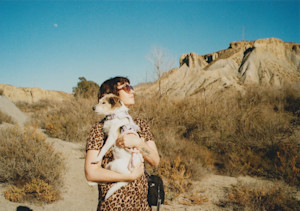
Marianne Eloise
Marianne Eloise’s work has appeared in The New York Times, The Guardian, The Cut, Vulture, and more. She is also the author of an essay collection Obsessive, Intrusive, Magical Thinkingopens in new tab. She has been going on adventures with her dog Bowie since she was 17.
Related articles
![Man hugging his fluffy white dog happily]()
Chemistry Between People and Dogs Is Real (It’s Science)
How the “love hormone” oxytocin connects us with our pups.
![Illustration of a woman hugging a dog]()
Your Dog Can Smell When You’re Stressed, New Study Says
Research finds that your pup can smell when you’ve been doom-scrolling, and they get bummed out.
![Woman looking into her Beagle dog's eyes.]()
Dog and Human Brains Sync When They Stare Into Each Other’s Eyes, New Study Finds
You and your pup are on the same wavelength—seriously.
![Man reading a book at home with small dog laying on his stomach.]()
You and Your Dog’s Heart Activity Match up When You Spend Time Together, New Study Finds
It’s like U2 said: Two hearts beat as one...
![A woman walking with her dog in a garden.]()
How to Take Your Dog On a Mindful Nature Walk
Wellness experts and animal trainers agree: A tuned-in outdoor outing can be restorative for both people and pets.
![A woman holding her dog close.]()
FYI, Your Dog Can’t Stand When You Do These 7 Things
Thanks, they hate it.

